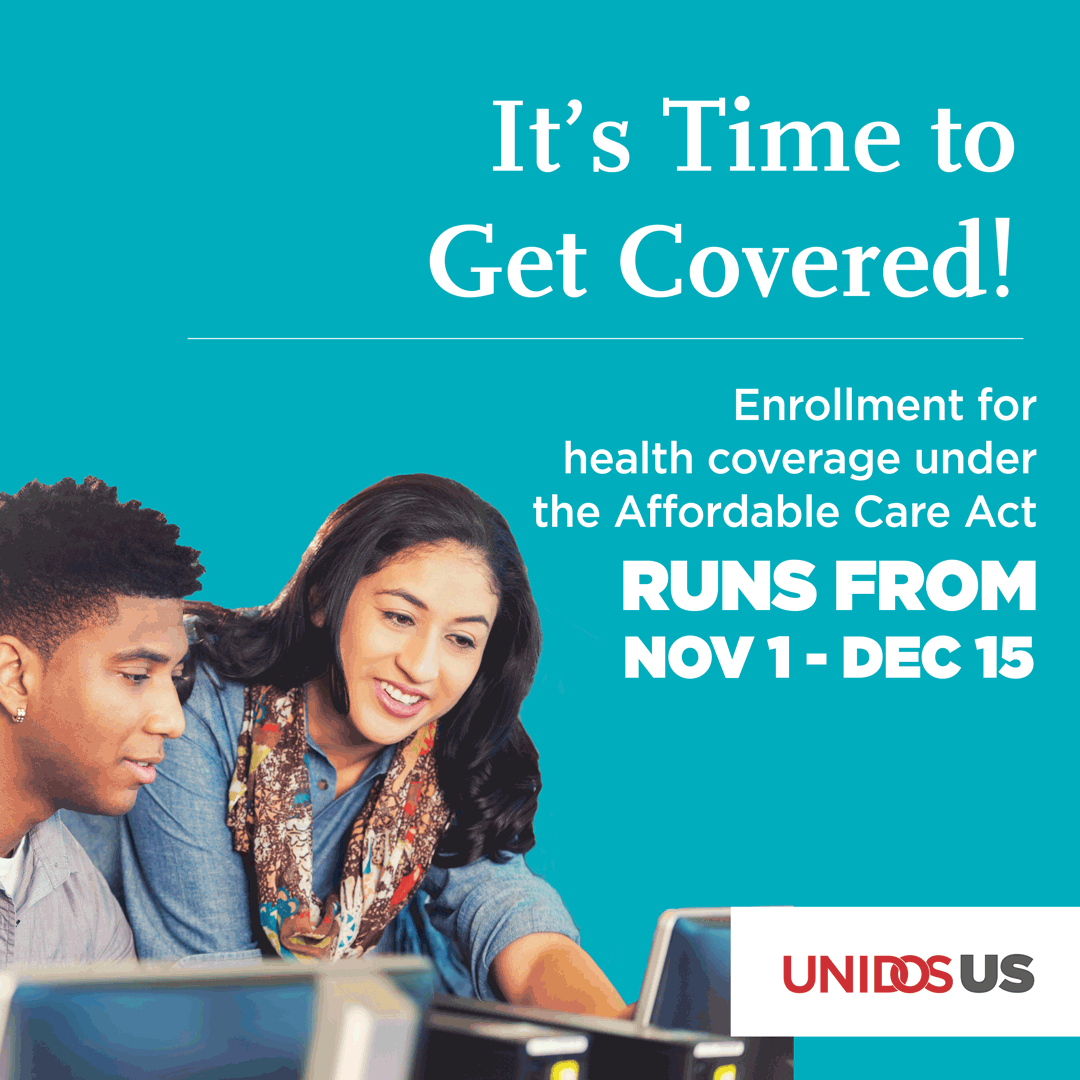Commentary: Two Líderes Avanzando Fellows Explain Why Undocumented Students Need Affordable Health Care to Get Through College
Year after year, hundreds of thousands of Latinx and first-generation college students head off to institutions of higher education with the goal of attaining a degree that can improve their chances of economic prosperity and increased engagement in American society.
According to UnidosUS’s recent report A Path Forward for Latinos: Laying the Groundwork for Equity in Higher Education, Latinos will make up 30% of the nation’s workforce by 2050, and they will require some type of degree or credential to contribute to efforts to rebuild the economy after the pandemic.
Over the year, Anna Rios and Priscila Largo, both participants of UnidosUS’s Líderes Avanzando Fellowship Program have been exploring how lacking access to affordable health care makes it harder for undocumented students to stay healthy, attend classes, and keep up with the cost of college.

The Undocumented College Student Health Care Dilemma
By: Anna Rios, UC Berkeley, Class of 2022, Molecular and Cell Biology
After a few moments in the waiting room reading a book and scrolling casually through my phone, the receptionist says “Anna Rios,” calling me up to the clinic’s front desk. I hand her my insurance card and ID, proceeding to a room to speak with a doctor. The wait time is often lengthy and finding an appointment opening can be a hassle. Nevertheless, besides those minor inconveniences, I leave the clinic relieved for having received a diagnosis and the medical prescriptions necessary. All this is possible due to the Affordable Care Act (ACA).
On the other hand, a friend of mine we’ll call “Angela,” is undocumented and therefore cannot benefit from the ACA. During an interview she gave me about her own health care experience, she mentioned she is uninsured and that an annual visit to her primary care clinic costs her about $100, compared to the $15 I usually pay.
“We hold back,” she says, noting that because of those costs she and her husband tend to wait longer to schedule a doctor’s appointment after noticing a problem in their physical health.
Angela also says she feels nervous whenever going to her primary care clinic or dentist’s office, a common reaction for many undocumented people who feel shunned in public spaces.
The ACA, also known as Obamacare, was adopted in 2010 as an effort to make affordable health insurance available to more people, especially those who are most likely to be underserved. As a U.S. citizen who benefits from the ACA, I visit the doctor regularly and schedule an appointment immediately whenever I am concerned about my health. The cost of my primary care visits is covered almost completely by my insurance, relieving my family and me of additional financial stresses. I enter clinics and hospitals at ease, never once questioning whether the wrong person will see me or if the information I provide will be used against me.
The undocumented community should have access to services that can help them integrate into American society. There is no good reason why individuals who live and work in this country, as well as pay taxes, should not be able to seek medical attention if they are sick. Lack of access to health care is yet another source of disenfranchisement, keeping undocumented people on the margins of society. The term “living in the shadows” applies to the approximate 10.5 million undocumented people in the United States. These individuals carry out their lives in fear, insecurity, and instability, not to mention the ever-present anguish of constantly seeing a world around them that they cannot access.
Many undocumented immigrants are essential workers, who already lack access to preventative health care and paid time off when they aren’t feeling well. These factors make them especially vulnerable to COVID-19. The pandemic has revealed exactly how much the United States depends on the health of essential workers to feed the country and fuel it’s economy. For the sake of citizens and non-citizens alike, the ACA must be revised to provide coverage for the undocumented community.
This vision of a healthy population is a foundation that allows all citizens to contribute to their academic and/or work environments in a meaningful manner and so that we, as a country, can focus on issues such as homelessness and income inequality. Health is fundamental to being able to tackle more complex socio-economic issues.
At many higher education institutions, health insurance is a requirement for enrollment. For students like me who are already benefiting from services provided by the ACA, this demand does not impede one’s decision to pursue a college degree. In high school, I tackled many challenges to be accepted into and enroll at a school like Berkeley, but my basic health needs were never a factor.
For undocumented students, this demand can be the deciding element. Those who decide to continue their studies often must work multiple jobs and address growing debts to pay for the health insurance fee. This clearly adds additional stress, preventing them from achieving their highest academic potential.
As a nation, shouldn’t we want everyone to be the best versions of themselves? Shouldn’t we want them all to grow, study and evolve into individuals who can later give back?
How will this be done? The Biden administration has argued for increasing taxes on Americans who earn more than $400,000 a year. This tax clearly does not apply to Americans who are living paycheck to paycheck, or even those who are middle class. The tax applies to people who are living more than comfortably and, with their annual earnings, most likely have savings in place. This latter group may protest, claiming that taxing them is equivalent to robbery. However, if they were to take a step back, they would see that such tax is more of an investment. Investing in the undocumented community is investing in the American economy. If the American economy flourishes, both the rich and the poor will benefit.

It’s Not Quality Affordable Health Care for All If It Doesn’t Include the Undocumented
By Priscila Largo, CUNY Lehman College, Senior, Health Education & Promotion
I was aware of my status from the day I set foot in this country. I was constantly told by my parents that I had to do well in school, that an education would open doors for a successful future, and education would give me the opportunities they were unable to get when they were my age in our home country.
I had to prove that I was worth staying in this country. I reasoned that if I went above and beyond, my security would be guaranteed. As such, I worked twice as hard as my peers, I got the awards, the certificates, I engaged in extracurricular activities, always worried that if I didn’t take every opportunity that came my way, I would be messing up my future here as an undocumented person.
My status has impacted every aspect of my life. I was fortunate to live in an undocumented- friendly state, New York, where children and parents without papers receive health care coverage up to the age of 19. Just as my coverage was ending, I was diagnosed with a prolactinoma, a non-cancerous tumor that develops in the pituitary gland and can lead to vision and reproductive health issues. I was expected to see specialists, and start treatment right away, however once my insurance was cut, I faced the hardship of paying hundreds of dollars for MRI scans and medicine. I had to choose between paying for my school tuition or seeking treatment, so I put off immediate treatment and decided to invest in my education. But after two years, my vision continued to deteriorate. Seeking treatment was no longer an option; it was a necessity. My case is just one of millions of other cases undocumented immigrants face due to the lack of health insurance.
By federal law, hospitals must treat patients even if they lack health coverage. This is how I have been able to continue my treatment. However, I am responsible for all costs incurred from the tests and medical procedures during my visits and treatments. Some hospitals have allocated some of their funds for charity care services, however this can vary from hospital and specialty to another, and it’s not something the undocumented community can always count on.
Until I had to face life without the protections offered by the state of New York, I didn’t realize the privilege it is to have health insurance in this country, to be able to walk into any doctor’s office, show them your insurance card and get attended.
Our country is facing a health crisis where access to healthcare is pivotal to keeping our country moving. “Access to quality, affordable health care for all,” is a phrase we’ve heard often too many times by legislators and government officials, without any real change. With a new administration in place, now is the time to push forward for health care reform that acts upon what it’s intended to and provides health coverage for ALL communities—no loopholes, no hidden restrictions. As part of the immigrant community, we demand the inclusion of undocumented immigrants as eligible candidates for healthcare coverage under a revised ACA.
Over the course of the past year, we have seen the repercussions of a failing U.S. health care system and the major impact of the current COVID-19 crisis nationwide. We have also seen how disproportionately this problem has impacted those who are low-income or come from communities of color. The need for access to quality affordable health care for all is a social/political issue that has been brought to the table over and over again but failed to make any progress.
Today I speak for the 10.5 million undocumented immigrants currently residing in the United States. We are one of the many underserved communities that contribute to this country through taxes, homeownership, children attending schools, and the workforce. However, we are denied access to health care coverage due to our legal status. According to the Center for American Progress, estimated seven million undocumented immigrants are currently helping uplift sectors including farming, fishing, forestry, waste management, and construction. This country has not considered the undocumented immigrant community as deserving of the essential access to health care coverage, despite our everyday contributions. It is clear and evident how essential we are to America’s recovery.
In my first year of community college, I realized my dream of becoming a medical physician wasn’t within my reach with my current status. No matter how hard I tried, I would simply not be able to get certain certifications and licenses without a valid Social Security number, and I would not be able to legally practice medicine without a work authorization. I will not let that stop me from pursuing other dreams though, and you can help.
Even if the government cannot clear an immediate pathway to citizenship for the undocumented, it can allow us to be able to get the appropriate health care services and coverage we need.
Please join me in lobbying our elected officials on this issue. The following facts can help you drive home the point:
- According to a 2018 factsheet from the Kaiser Family Foundation, a nonprofit organization focusing on national health issues, 45% of undocumented immigrants lack health insurance. Uninsured individuals are less likely to seek necessary medical care, preventive services such as yearly physical, blood pressure and cholesterol checks, among other screening are essentials to prevent chronic disease. And according to the economic policy think tank American Action Forum, approximately 47% of the U.S population suffers from at least one chronic illness, a rate that is projected to continue growing. Health insurance is crucial both for prevention and treatment.
- According to data from the think tank New American Economy’s Cities Index, in 2019, undocumented immigrants paid $30.6 billion in taxes. These yearly contributions help fund Medicaid, Medicare, and Social Security. In other words, we help fund benefits for the rest of the American society, but we are prohibited from being able to use them.
- According to data compiled by the Center for American Progress, five million—nearly three in four undocumented immigrants in the workforce are considered essential workers.
Our new legislation has proposed a possible public option for insurance which allows undocumented immigrants to buy health insurance, however until this bill is passed and signed into law, we, the undocumented community will continue to push for our inclusion in the ACA. The undocumented immigrant community has compromised their health to assist the needs of the nation, we only ask that our essential health and wellbeing is also considered when implementing health care reform.




